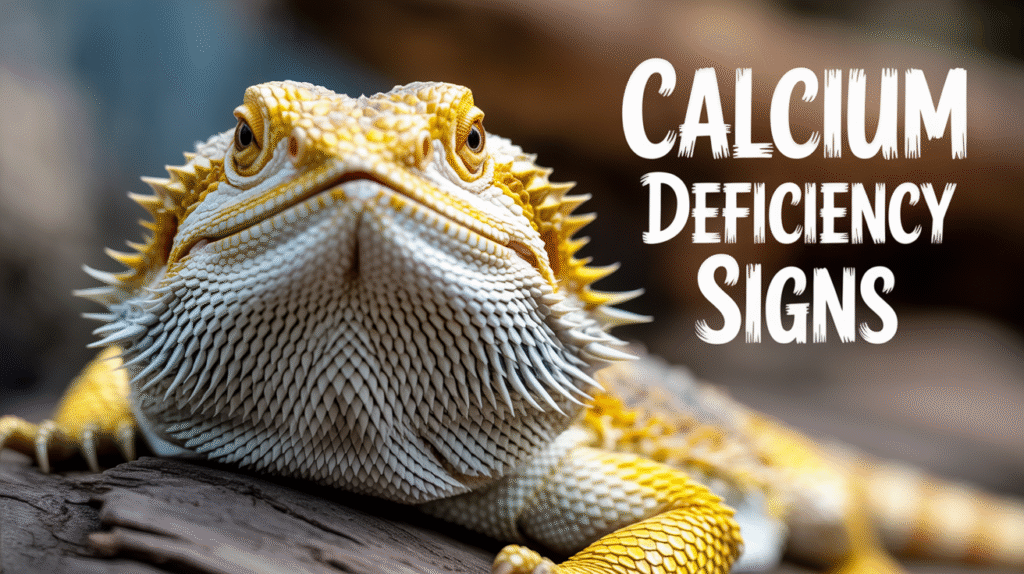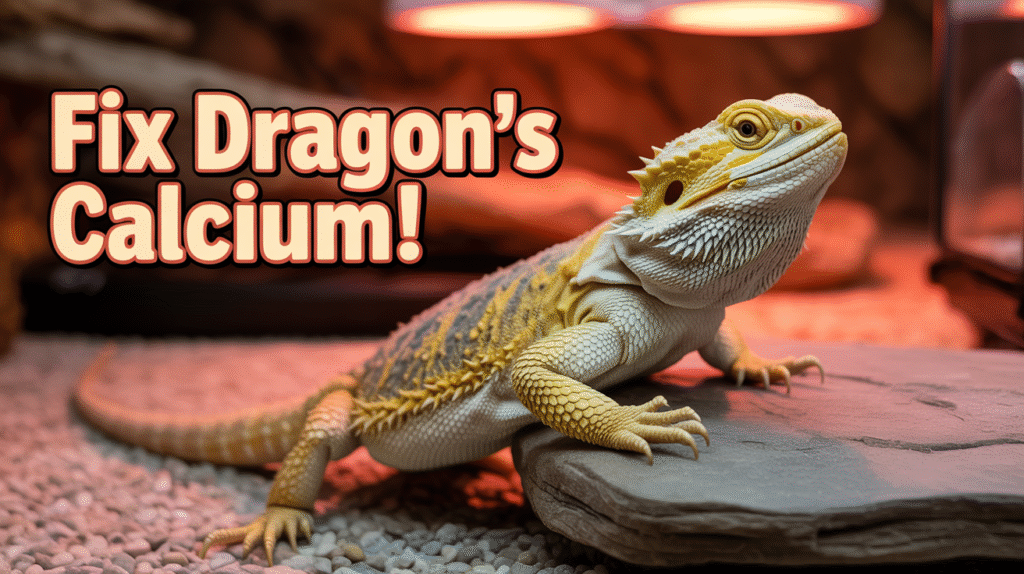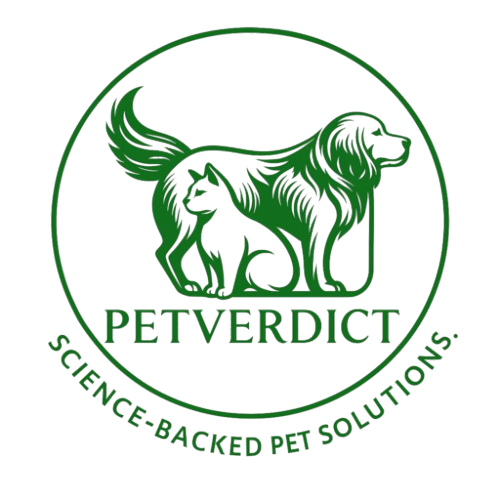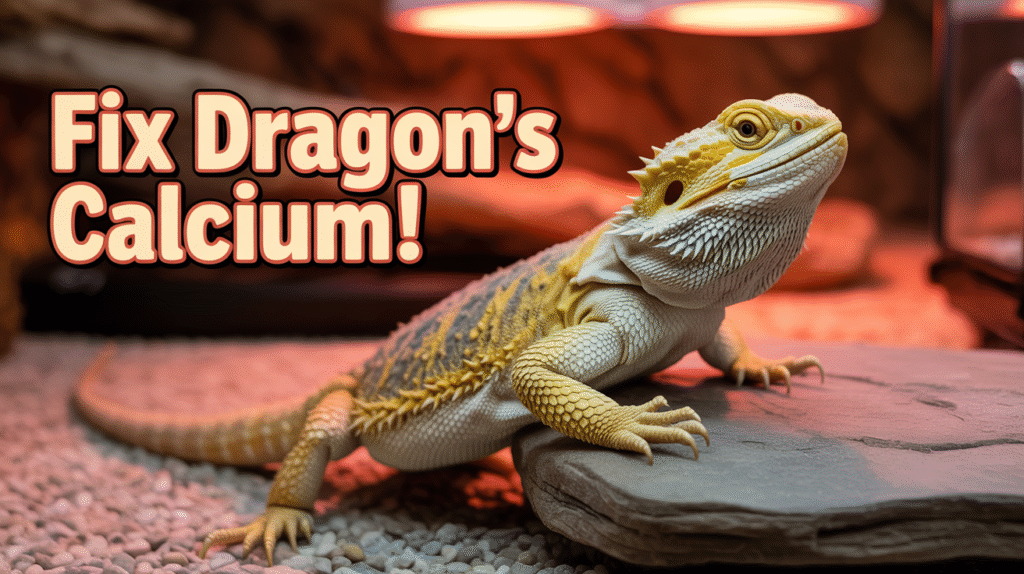Key Takeaways
- A proper diet for bearded dragons consists of leafy greens and gut loaded insects which provide them with the calcium they need. Don’t make the mistake of feeding him just low-calcium foods.
- Adequate UVB lighting is crucial for calcium metabolism. Set up proper lighting, and swap bulbs out on a regular basis.
- Beware of the calcium/phosphorus ratio in your dragon! Eat smart for a healthy balance.
- Recognize signs of gut impaction because it may prevent calcium absorption. Make sure your dragon is hydrated and you feed properly sized insects.
- Annual vet visits are crucial to diagnose underlying health problems that can impact calcium metabolism. Be watchful for any changes in your dragon’s health.
- Take initiative and put together a calcium deficiency prevention checklist with lighting, diet and hydration tactics. Note any concerns for the vet.
Bearded dragon calcium deficiency is a condition that arises in these reptiles when they lack sufficient calcium in their diet, resulting in health problems like metabolic bone disease. Calcium is essential for their skeletal robustness as well as overall vigor. Insufficient UVB exposure and dietary issues cause this deficiency. Symptoms can include weakness, lethargy and difficulty moving. Offering a diet balanced with calcium-rich foods and supplements will help avoid these issues. Frequent check ups and environmental changes are important. Knowing the symptoms and remedies of calcium deficiency in bearded dragons can aid their well-being and lifespan.
What Causes Bearded Dragon Calcium Deficiency?

Bearded dragon calcium deficiency can come from a few factors. Knowing what causes bearded dragon calcium deficiency is essential to bearded dragon health.
1. Inadequate Diet
One of the biggest causes of calcium deficiency is an improper diet. Bearded dragons require a well-balanced diet consisting of plenty of leafy greens and calcium. Greens such as collards, dandelion leaves and kale should be a daily staple. Depending on only low-calcium foods will result in some serious health problems. For instance, if your dragon mostly eats lettuce, it might not be getting enough calcium.
Adding in gut loaded bugs will make a huge difference to their calcium intake. Hornworms, phoenix worms and silkworms are all not only nutritious but high in calcium. It’s important to pay attention to the nutritional content of any foods provided and simply checking calcium levels regularly to make sure your dragon is getting what he needs.
2. Poor Lighting
Another key culprit is inadequate lighting. Inadequate UVB lighting can interfere with the bearded dragon’s ability to metabolize vitamin D3, which controls calcium and phosphorus. Installing adequate UVB lights that help process calcium. The distance between the light and the enclosure also makes a difference, too far and the dragon won’t receive the benefits.
Don’t forget about replacing UVB bulbs – UVB exposure is crucial to effective calcium absorption! Basking behavior of your dragon can help confirm lighting is sufficient. If they’re not basking, that’s a sign that you don’t have enough light!
3. Incorrect Ratios
The Ca:P ratio of the diet should be considered. A healthy ratio is essential for optimal metabolism. That is, tweaking your diet options to keep a sound ratio of these minerals. Knowing what to feed bearded dragons can avoid this.
Routine evaluations of feeder insect and green nutritional values keep this balance. If the ratio is off, it can result in metabolic bone disease (MBD), a serious calcium deficiency disease.
4. Gut Impaction
Gut impaction can prevent calcium absorption. Knowing impaction signs is key to this problem. Keeping your buddy well-hydrated will stave off digestive blockages, which can interfere with nutrient uptake. Providing properly sized insects can minimize choking.
Keep a watchful eye on feeding to prevent overfeeding that causes impaction and complications.
5. Underlying Illness
Lastly, underlying illnesses can disrupt calcium metabolism. Watch for symptoms. Routine vet visits are critical for early detection of issues. Digging into sudden changes in your dragon’s health can lead to important insights.
Recognizing the Signs

Recognizing the signs of calcium deficiency in bearded dragons is vital. Any physical or behavioral change can be a warning sign, especially metabolic bone disease which creeps up on your reptile.
Physical Symptoms
One of the earliest symptoms of calcium deficiency is muscle twitching and weakness. This can take the form of jittery motions, which can appear innocuous in the beginning but must not be overlooked. Lethargy is typical; your bearded dragon could slow down and display reduced appetite, losing weight.
Check your dragon for deformities too. Bone deformities can manifest as bowed limbs or an odd-shaped jaw. These deformities are frightening and represent a sign of deep-seated problems. Watch for broken bones–fragile bones break more easily and any fractures need to be addressed right away.
If untreated, symptoms can advance to more severe manifestations including limb tremors, seizures, and paralysis. These signs are indicative of a more advanced stage of metabolic bone disease and warrant immediate veterinary treatment.
Behavioral Changes
Behavioral observations give you important clues as well. Activity level changes are typical. If your dragon is more skittish or appears aggressive, it may be an indicator of distress. Just as with irritability, withdrawal from social interaction can point to inner distress or pain.
Excessive basking is yet another thing to watch for – a bearded dragon will often seek warmth more than usual if it isn’t feeling well. Hiding can be a coping mechanism as well — reptiles typically hide away when they’re not feeling their best.
Feeding can go all wonky, too. A loss of appetite should raise red flags. Maintaining a dragon log of your dragon’s dragonisms is essential. This log can assist with recognizing any worrisome changes that may signify emerging metabolic bone disease.
Proactive Prevention Strategies
As such, preventing calcium deficiency in bearded dragons requires the utilization of multiple proactive strategies. These include habitat, diet, and routine health examinations.
A checklist for proactive prevention includes:
- Ensure proper UVB lighting and basking conditions.
- Regularly supplement calcium in your bearded dragon’s diet.
- Educate yourself on their specific needs and behaviors.
- Schedule regular veterinary check-ups.
It’s also important to provide ample UVB lighting. Bearded dragons require 10 to 12 hours of UV light per day for optimal vitamin D3 synthesis — which is necessary for calcium absorption. Basking temperatures should be 35-40°C, with cooler areas at 25-28°C. This temperature gradient lets your dragon thermoregulate, supporting their health.
Beyond lighting, routine calcium supplementation is essential. Dust their food with calcium powder a few times of week to make sure they get enough of this important nutrient. Calcium-rich foods such as collard greens, dandelion greens and certain fruits should be their mainstay. Of course balanced nutrition will do more than prevent deficiencies.
Learning about bearded dragon care is essential to their wellness. Knowing their dietary and habitat needs goes a long way in avoiding problems. Do some solid research or ask seasoned reptile owners for advice.
Lastly, routine vet visits, at least once every 6 to 12 months, can assist in identifying possible health problems early. These early visits, in the first week or so of bringing your bearded dragon home, are key to catching any underlying issues. Annual fecal exams should be included in your care routine to screen for internal parasites like coccidia and pinworms that can cause serious complications.
Keeping a stocked emergency kit, with basic first aid and even calcium supplements can be life-saving. A warm bath of 90°F (32°C) for approximately 15 minutes will help to shed the skin and avoid health problems.
Correcting the Imbalance
Correcting calcium deficiency in bearded dragons means taking a multi-pronged approach centered around diet, supplementation, and observation. This portion dissects actionable advice for at-home care and veterinary involvement.
At-Home Care
- Do’s:. . * Provide leafy greens like collard greens and dandelion greens.. * Offer calcium-rich insects such as roaches and crickets.. * Ensure access to clean, fresh water daily.. * Use UVB lighting to support vitamin D synthesis.
- Don’ts: . . * Avoid feeding only fruit, which lacks vital nutrients.
- Don’t forget about heat gradients in the habitat.
- Never forego regular health checks for deficiency.
A diversified diet is key for bearded dragons. With the addition of dark leafy greens and calcium-fortified bugs, their nutrient intake should really take off. Provide a variety of foods so that there is a balance of vitamins and minerals. Hydration is key. Misting their enclosure or supplying a bowl of water on the ground keeps them hydrated. Light care session handling can de-stress your dragon and make them more malleable to diet changes.
Veterinary Intervention
In extreme cases, an exotic vet is a must. They can determine the extent of the calcium deficiency and suggest specific treatments. Taking medications as directed is critical for healing. Just be sure to follow up with your dragon’s progress closely.
It’s essential to address any potential underlying health issues with your vet. Issues such as metabolic bone disease can hinder recuperation and demand expert treatment.
The Calcium Cascade Effect
Calcium is vital for the health of your bearded dragons. Calcium imbalances may lead to serious health problems. Knowing these implications underscores the critical need for early intervention.
The longterm consequences of these untreated calcium deficiencies can be dire, impacting both bone and metabolic health. Below is a table summarizing these effects:
| Long-term Effects | Description |
|---|---|
| Metabolic Bone Disease | Causes weakened bones, leading to fractures and deformities. |
| Muscle Tremors | Impairs muscle function, resulting in tremors and weakness. |
| Organ Dysfunction | Affects organs like the heart and kidneys, leading to overall health decline. |
| Neurological Issues | Can cause seizures or other neurological problems due to calcium’s role in nerve function. |
Calcium is connected to so many health factors. It facilitates muscle contraction, nerve transmission, and blood clotting. Low calcium in a bearded dragon causes muscle tremors, which prevent the animal from moving or eating. If unaddressed, these can turn into major problems that are harder to recover from.
Early action is the best way to avoid these complications. Knowing the signs of calcium deficiency — lethargy, poor appetite and abnormal postures — means it can be treated in time. A good calcium-rich diet and supplements can help to restore levels. Frequent vet visits prevent deficiencies from causing irreparable damage.
Choosing Your Supplements
They’re not all the same, and a little thought will go a long way in getting the best for your furry companion. Here are the most important considerations when choosing calcium supplements.
- Specific needs of your bearded dragon
- Ingredient lists for harmful additives
- Comprehensive dietary strategy integration
- Product form (powder vs. Liquid)
- Reputable brand research
Calcium Types
| Type of Calcium | Advantages | Considerations |
|---|---|---|
| Calcium Carbonate | Widely available and cost-effective | Lower absorption without vitamin D3 |
| Calcium Citrate | Higher bioavailability | More expensive, but better for absorption |
| Calcium Gluconate | Gentle on the stomach, good for sensitive dragons | Less concentrated; may require larger doses |
Select calcium supplements that contain vitamin D3, as this vitamin helps calcium absorb very much. Without it, your dragon may not actually use that calcium, resulting in deficiencies despite it being given.
Calcium form also counts. Powders can be simpler to mix into food and liquids can be easier to directly administer. Consider your feeding style to see what best fits you. Shop for quality – Look for names you’ve heard for reptile supplements, as the quality varies widely. Seek out companies with good reviews and clear ingredient sourcing.
Multivitamin Role
Using multivitamins can help your bearded dragons health. Make sure the multivitamins include the required vitamins and minerals such as vitamin A, vitamin D3, and essential B vitamins. They assist everything from immune function to energy metabolism.
Find the right balance of multivitamins and calcium supplements. Too much can cause health problems, including toxicity. Keep an eye on your dragon’s health and supplement accordingly! If your dragon becomes lethargic, has a poor appetite, or acts weird, reassess their nutritional plan, including their supplement regimen.
Conclusion
Know to bearded dragon calcium deficiency to keep your pet healthy. Knowing the causes and symptoms will help you to act quickly. Preventive measures, such as nutritious food and frequent vet visits, can avoid a lot of problems. When a deficiency strikes, addressing it with supplements and diet can fix the imbalance. Opt for quality supplements to guarantee your dragon receives what it requires.
Doing this keeps your beardie thriving! So keep yourself posted! A little effort goes a long way towards a long, healthy life for your scaly companion. Discover additional guides and engage with fellow owners to exchange tips on care and diet.
Frequently Asked Questions
What is calcium deficiency in bearded dragons?
Calcium deficiency is when your bearded dragon doesn’t get enough calcium in their diet. This in turn can create serious health problems including metabolic bone disease, impacting their bones and overall health.
How can I tell if my bearded dragon is calcium deficient?
Symptoms of calcium deficiency are lethargy, weakness, inability to move and bone deformities. If you observe any of these signs, seek veterinary advice for diagnosis and treatment.
What causes calcium deficiency in bearded dragons?
Calcium deficiency can be caused by a poor diet, inadequate UVB exposure or incorrect supplementation. Make sure your beardie gets a varied diet with plenty of calcium and adequate UVB exposure.
How can I prevent calcium deficiency in my bearded dragon?
To avoid calcium deficiency, offer a diet balanced with calcium-rich foods, apply UVB lighting, and supplement with calcium if necessary. Routine vet visits can keep tabs on their well-being.
What should I do if my bearded dragon is calcium deficient?
If your beardie appears to be calcium deficient, take him to the vet right away. They can suggest changes in diet, supplements, or treatments to address the deficiency and enhance your pet’s well-being.
Are there any specific supplements for bearded dragons?
Yes, there are calcium supplements out there for reptiles. Check for products with vitamin D3, which helps calcium absorption. Dosing instructions should always be observed for best results.
How often should I supplement my bearded dragon’s diet with calcium?
Dust your bearded dragon’s diet with calcium powder twice or three times a week. Modify the schedule according to your pet’s age, dietary, and health requirements and consult with a vet for personalized guidance.





